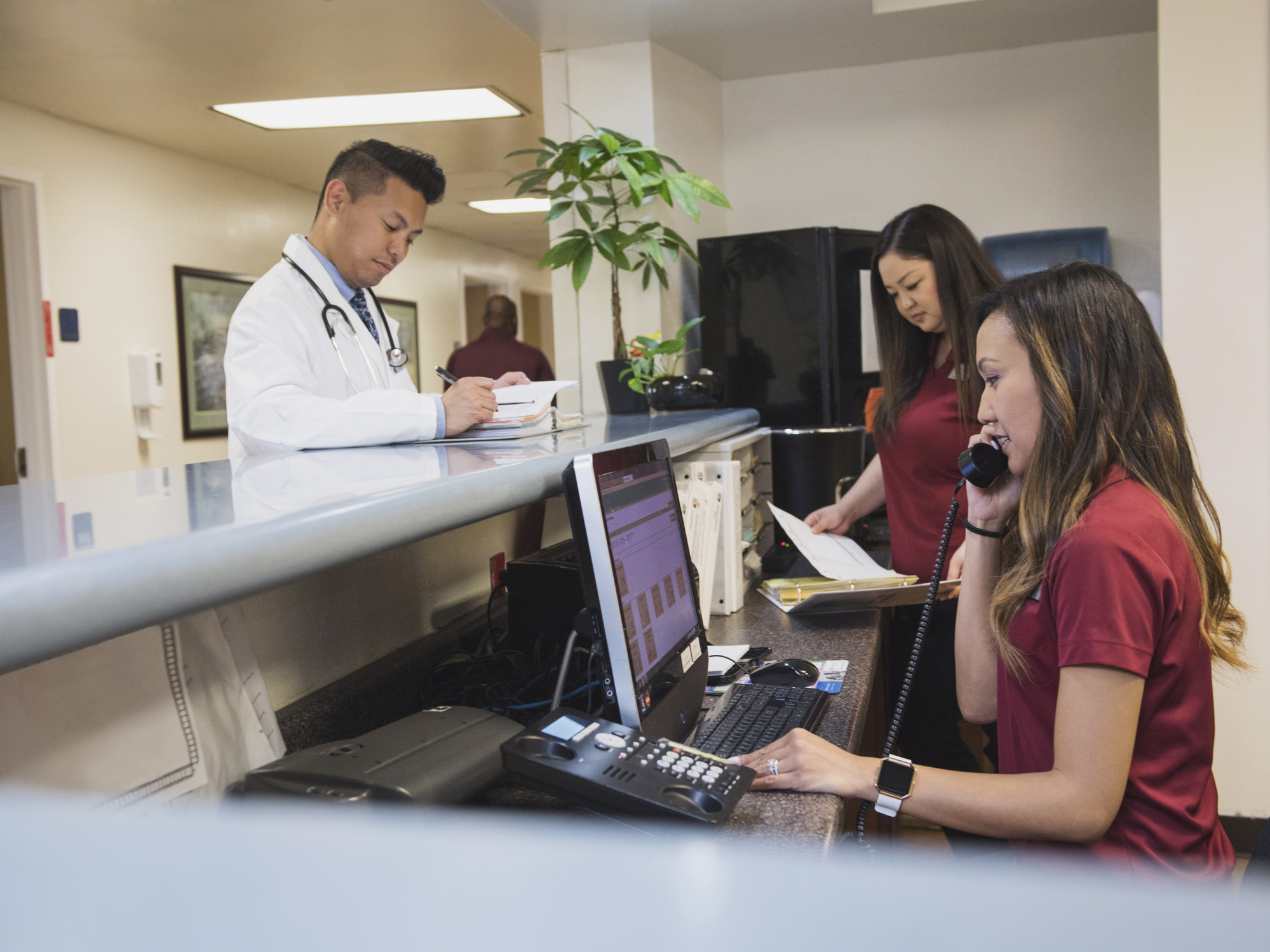Best Online Associate in Medical Assistant Programs
Accredited online medical assistant programs provide the training for a career in medical assisting. Learn more about how to become a medical assistant.
3,700+ Nonprofit, accredited colleges analyzed

6,000+ Users connected with programs every month

300+ College and university partners

40+ Expert reviewers
Learn more about our Editorial Policy and Standards and Advertising Disclosure.
- Employment for medical assisting is growing much faster than other jobs.
- An associate in medical assisting only takes about two years to complete.
- Medical assistants can specialize in podiatry or optometry and potentially earn higher salaries.
- With an associate degree, you can stand out in a field where many medical assistants hold certificates and diplomas.
If you want to start a career in healthcare quickly, you might consider becoming a medical assistant. While you only need a certificate or diploma to start a medical assisting career, an associate degree can help you stand out during the hiring process. The degree can also lay the foundation for better-paying medical careers and earning a bachelor’s degree.
Two-year medical assistant programs prepare you for entry-level careers as a nursing assistant, occupational therapy assistant, and health information technician. And the administrative and clinical topics covered in medical assistant programs also better prepare you for certification exams that some states require.
If you’re considering an online medical assistant degree, here’s what to do next:
- Explore this page to determine whether this path is the right choice for you.
- Check out the top-ranked online associate in medical assistant programs and our sponsored programs.
- Request more information from schools you’re interested in to find the best fit for you.
What Can You Do With a Medical Assistant Associate Degree?
With an associate in medical assistant degree, you can pursue several in-demand healthcare careers. You can either become a medical assistant or pursue other roles, such as a transcriptionist or health records technician. Some roles may require more training or certifications.
An associate in medical assistant degree can give you a competitive advantage when applying for jobs. The degree can also prepare you for a bachelor’s program in a healthcare discipline.
Why Should I Get a Medical Assistant Associate Degree Online?
An online medical assistant program is a good option if you want to get started working in a hospital or doctor’s office. Medical assistants learn under the supervision of doctors and licensed nurses.
And the credits you earn in a two-year online medical assistant program can go toward a bachelor’s degree, shortening your graduation timeline. More reasons for enrolling in an online medical assistant program and its benefits include:
Benefits of a Medical Assistant Associate Degree
- You’ll gain a broad medical education and make a difference in patients’ lives.
- Two-year medical assistant programs can enhance your ability to land a job.
- Credits you earn can go toward a bachelor’s degree.
- Medical assistant programs train you for clinical and administrative roles.
Reasons to Get Your Medical Assistant Degree Online
- Online degrees offer more affordability and flexibility.
- You can continue working your day job while you go to school.
- Asynchronous courses let you complete the program on your schedule.
- Some online medical assistant programs offer accelerated pathways.
What Are the Best Online Associate in Medical Assistant Programs?
Rankings compiled by the BestColleges Ranking Team
How We Rank Schools
Herzing University-Madison
Madison, WI4 yearCampus + Online
$13,320
$13,320
92%
98%
100% Online Courses, In-Person Clinicals | Scheduled Classes
Avg. Cost per Credit
In State | $446
Out of State | $446
Credits to Graduate
60
Program Information
Program Accreditation | Higher Learning Commission
At Herzig, you can earn an associate in medical assisting in 20 months. The 60-credit AS in medical assisting services requires online courses and a 180-hour externship at a healthcare facility.
The program prepares you to sit for the registered medical assistant certification exam. Herzig pays for your first exam attempt. You'll receive access to extensive virtual services, like tutoring and technical support. Admission requires a high school or GED diploma.
$10,800
$10,800
75%
2,392
Private
Yes
$13,320
$13,320
Madison, WI4 yearCampus + Online
$13,320
$13,320
92%
98%
$10,800
$10,800
75%
2,392
Private
Yes
100% Online Courses, In-Person Clinicals | Scheduled Classes
Avg. Cost per Credit
In State | $446
Out of State | $446
Credits to Graduate
60
Program Information
Program Accreditation | Higher Learning Commission
At Herzig, you can earn an associate in medical assisting in 20 months. The 60-credit AS in medical assisting services requires online courses and a 180-hour externship at a healthcare facility.
The program prepares you to sit for the registered medical assistant certification exam. Herzig pays for your first exam attempt. You'll receive access to extensive virtual services, like tutoring and technical support. Admission requires a high school or GED diploma.
Keiser University-Ft Lauderdale
Fort Lauderdale, FL4 yearCampus + Online
$19,808
$19,808
97%
48%
100% Online | Scheduled Classes
Avg. Cost per Credit
In State | N/A
Out of State | N/A
Credits to Graduate
60
Program Information
Program Accreditation | Southern Association of Colleges and Schools Commission on Colleges
Keiser provides a strong healthcare program that includes associate degrees delivered online. The 60-credit AS in medical assisting science prepares you to sit for the registered medical assistant exam.
You'll take courses in pharmacology and medical law and ethics. The curriculum also teaches medical office management skills like how to prepare insurance claims and use electronic medical records software. You'll complete clinicals and an externship in medical assisting. Admission requirements include a high school or GED diploma.
$27,162
$27,162
60%
20,330
Private
Yes
$19,808
$19,808
Fort Lauderdale, FL4 yearCampus + Online
$19,808
$19,808
97%
48%
$27,162
$27,162
60%
20,330
Private
Yes
100% Online | Scheduled Classes
Avg. Cost per Credit
In State | N/A
Out of State | N/A
Credits to Graduate
60
Program Information
Program Accreditation | Southern Association of Colleges and Schools Commission on Colleges
Keiser provides a strong healthcare program that includes associate degrees delivered online. The 60-credit AS in medical assisting science prepares you to sit for the registered medical assistant exam.
You'll take courses in pharmacology and medical law and ethics. The curriculum also teaches medical office management skills like how to prepare insurance claims and use electronic medical records software. You'll complete clinicals and an externship in medical assisting. Admission requirements include a high school or GED diploma.
How Much Does an Online Associate Degree in Medical Assisting Cost?
Average Annual Tuition Cost of an Associate Degree
$3,501
Total Average Cost for Two Years of College at a Public School
$18,750
According to the National Center for Education Statistics, as of 2020-2021, tuition for an associate degree costs $3,501 on average per year at a public two-year college. Students at public four-year colleges paid an average of $9,375 per year on tuition.
Costs vary depending on your residency status and the college. But you can save money by taking a medical assistant program at a two-year school instead of a four-year institution.
Community college is a popular route for people who want a quicker and more affordable education than a four-year degree.
Is a Medical Assistant Associate Degree Worth It?
Enrolling in an accredited medical assistant program online is worthwhile to get started in an in-demand healthcare position. And you can stand out with an associate degree in a field where many medical assistants hold certificates and diplomas.
Medical assisting is also a gateway to higher-paying medical careers. You can put your college credits toward a higher-level degree and gain on-the-job training to advance your career. The degree is also broad enough that you can choose from clinical or administrative positions.
How Much Do Medical Assistants Make?
(Source: Bureau of Labor Statistics, May 2021)
While medical assistants make less than the national median for all jobs, the Bureau of Labor Statistics (BLS) reports that they can earn better pay at agencies, brokerages, and other insurance carriers. Medical assistants in these settings earned an average annual salary of $52,970 in May 2021. Other top-paying industries for medical assistants include:
- Professional and commercial equipment and supplies merchant wholesalers
- Outpatient care centers
- Electronic shopping and mail-order houses
- Insurance carriers
In addition, the BLS reports that California, Washington, Massachusetts, and Alaska pay higher-than-average wages for medical assistants. Workers in these states earned an average yearly salary between $44,200-$47,320 in May 2021.
What Jobs Can You Get With a Medical Assistant Associate Degree?
Medical Assistant Career Paths
- Health Information Technician
- Nursing Assistant or Orderly
- Occupational Therapy Assistant
- Pharmacy Technician
- Psychiatric Technician
- Phlebotomist
- Medical Transcriptionist
- EMT or Paramedic
In an online medical assistant program, you’ll learn clerical duties, such as scheduling patients and medical coding. On the clinical side, you’ll also learn to take vital signs, prepare injections under physicians’ supervision, and help patients get ready for exams.
According to the BLS, about 421,960 medical assistants work in physician offices. General medical and surgical hospitals employ the second-highest number of medical assistants.
How Long Does It Take to Get an Associate Degree in Medical Assisting?
Any associate degree takes an average of two years for full-time learners, with an exception for accelerated degrees. If you enroll in an accelerated medical assistant program, you can graduate in as quickly as 18 months. If you enroll as a part-time student, it may take you longer to finish your degree and become a medical assistant.
Required Course Credits
60
Field Study Requirements (Y/N)
Yes
*Depending on your program and specialization
Everything Else You Need to Know About Medical Assistant Degree Programs
Is being a medical assistant a good career?
Medical assisting is an in-demand career that can be a good starting point for pursuing other fulfilling medical occupations. The BLS projects jobs in medical assisting will grow by 16% from 2021-2031, which is much faster than the average growth rate of 5% for all jobs.
While a medical assistant salary is below the median annual wage for all U.S. occupations, pursuing higher education and certifications can enhance your pay.
What does a medical assistant do?
Medical assistants fall into two categories: clinical medical assistants and administrative medical assistants. Depending on the medical facility, a medical assistant may focus on clerical work or clinical duties — and some balance office and medical room responsibilities.You can also specialize in specific areas of medical care, such as ophthalmology, optometry, and podiatry. A podiatric medical assistant has more specialty duties, such as applying casts and splints.
How do you get a medical assistant certification?
You must pass a certification exam to earn a medical assistant credential. To qualify for a certification exam, you must complete a medical assisting program that includes a practicum. Certification exams vary by accrediting agencies.
Possible credentials include certified medical assistant, registered medical assistant, and certified clinical medical assistant. You can also get specialized certification to work in podiatry and paraoptometry.
Employers may not require you to get certified to get hired, but certain states mandate certification. Credentials help medical assistants to advance in their careers, find specialized positions, and earn a higher salary.
Still looking for the right fit? You might also like:
Explore More College Resources
Other Healthcare Resources
Healthcare
programs
careers







